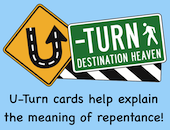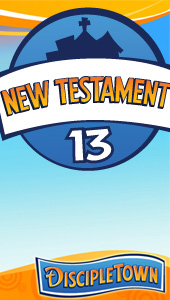More Positive Classroom Ideas (2 of 2)
Membership Level› Guest
Author/Source: Trisha Peach
Topic: Discipline
Almost every teacher in a church's children's ministry is looking for help to manage the classroom. Pastor Trisha Peach shares her best and time-tested discipline ideas. Part 2 of Pastor Trisha's articles on Discipline.
1.Have a written discipline policy and POST it. As far as your official policy for classroom discipline goes, you need to be thinking “objective” as much as possible, not “subjective.” For example, you shouldn’t be saying things to kids like “you should know better” (many of them do not), “stop acting up” or “cut all that out” (that is WAY too broad) or “you guys are being terrible today”(again, that is not very specific). And when you have trouble explaining exactly which rule was broken, and the steps you took to correct the behavior, it begins to look like you are singling out one child “picking on a certain kid” because you personally do not like them. And it is always best to not make any of this personal. Parents need to be your biggest partners and advocates; HOWEVER- nothing brings out a parent’s defensiveness and distrust, than when they believe you are singling out their child. Objective policies, rewards and consequences protect YOU.
I also highly recommend that you post your classroom policies in SEVERAL high traffic areas of your church. Send copies home for parents to sign. Have parents SIGN copies of your behavioral policy when they register their child. Put the policy on your kid’s ministry bulletin and your website. Put it on the check in desk, lost and found, visitor center, by the bathrooms etc. How does this help you and your volunteers and the parent? When a parent comes to pick up their child, I or my volunteer may have to explain to them that their child had a tough day (we try not to do this very often). I will explain the rule that was broken and exactly how we handled it, and all of the steps we took.
For example “Hi there Mrs. Erwin! We had a couple of difficulties today that I wanted you to know about.Jaden called a child a ‘loser’ within earshot of his teacher. Our leader asked him to not call names, because our rule number 3 is ‘No Mean Talk’, and the first intervention is asking the child to stop. (Point at the wall next to you and point out the rule clearly posted for the WIN! ) Then it happened a second time 6 minutes later. We spoke with both boys and apparently this is an argument they were having at school this week that has spilled over into church. We used it as a teaching moment to talk about the love of Jesus and forgiveness. We asked Jaden to sit in the back by his teacher during worship, which is our second step in intervention. If it had happened again, we would have paged you. The rest of the kid’s service went great; we just wanted you to know, and how we handled it. We cannot wait to see you again next week. Please email or call me if you have any questions or insights for us.” The clearly posted rules, and carefully followed consequences show the parent you are not singling out their child, and that you care about ministering to every child. You have a plan in place and you are doing your best to follow it!
This works very well when you are talking with a child as well. I will point to the rule on the sign and say, “I know you want to run up and down the halls Kylie, but the answer is no. See the rule? We do not want you to get hurt or lost. We do not allow anyone to run up and down the halls, especially during service. It wouldn’t be fair to say no to everyone else in the church, but to make an exception for only you. So let’s be fair and follow the rules. I can trust you right? Otherwise you’ll have to sit in the back with Mr. Mike for today. Ok, glad to hear it. Thanks!” Printed rules carry more weight and are easier to enforce than rules that seem to be pulled out of the air.
2.Keep it short and sweet. Too many churches make the mistake of putting their kid’s church rules and policies in a gigantic binder, a binder that sits on a shelf collecting dust. Many church leaders have long forgotten where there giant binder even is! Do you really think your parents or your leaders are going to read all the way through that binder or remember what is in it? You should have your kid’s ministry policies and procedures on ONE paper, no more than front and back (2 sided). It is ok if this is a condensed version of your giant binder; I’m just telling you, that with the onslaught of info barraging your parents and leaders every day, they are not going to read and process your whole binder. So put what they REALLY need to know onto two easy to read pages. Also, please keep your discipline policy-especially the one you are posting!- POSITIVE. When I am visiting a church, and I see a classroom discipline policy that is one long list of rules, and punishments, my first thoughts are, “Wow, they must really be having problems here” “This is NOT going to be fun” and “Maybe my kids should just stay with me.” Your kid’s ministry needs to be about having an experience in God’s Presence, connecting with great Christian friends and adult mentors, about stepping out to serve and about having FUN. If your program is well planned and well executed you shouldn’t need a long list of threats posted everywhere. You only have one hour to make a difference. Don’t waste the whole hour constantly correcting. See if you can tell the differences between these two posted classroom discipline policies:
“No swearing, no using God’s Name in vain, no name calling, no disrespectfulness, no eye rolling, no spitting, no inappropriate noises, no poking, no hitting, no moving your chair, keep all four chair feet on the floor, no crawling on the floor, no leaving, raise your hand if you want to speak, no interrupting, no fighting, no damaging property, no stealing, etc. etc. etc. If you do these things, we will tell your parents, you will be sent to ‘big church”, we will tell the pastor on you, and you may be “kicked out”.
The above list actually went on for a lot longer than this. My problem with it and policies like it is that is it predominately negative, and it focuses on “NO” instead of what you are there to do. Contrast the above policy with this one;
A. Please pay attention at all times so that everyone can see and hear the whole program without distraction. This means no phones or electronics!
B. For your safety, if you need to leave the room, please tell your teacher. Otherwise, stay in your seat and enjoy!
C. Roughhousing, and horseplay is for other times and places. Hands to yourself in church so no one is distracted.
D. Church is an amazing place to meet with God and great friends. We do not do ANY mean talk in the house of God.
E. Have Fun! Participate! We hope you have a great time, leave having learned something new, and come back next week with some friends!
Anyone who is having a tough time paying attention and following the rules today will get one warning from their leader. On a second warning, they will need to sit with their leader in the back of the room while the service continues. On a third warning, we will meet together with your parents and figure out how we can help have a better experience next week.
So let’s have a great morning today at Kid’s Rock Worship Center!”
I really like the second policy better for several reasons: A. It focuses on the positive and reminds the parents, leaders and children why we are really here today. B. It is short enough to post and refer back to as many times as needed C. It covers most if not all of the major bases, without trying to list each and every single infraction and penalty. D. It does not make ANYONE a “bad guy” or an “enemy”- not the parent, or the child, or the leader, or the pastor or the church. E. The focus is not on punishment, alienation or rejection. The focus is on ministry to that child for that hour. F. The first impression here is “Something amazing and well planned is about to happen here today.” “I do not want to miss this” “Sounds fun”. This generates excitement for your kid’s service instead of giving the child bad ideas, or inciting rebellion. It left me really curious to see what they had planned for their kid’s service- and they did not disappoint! Make it short, but make it sweet. Keep ‘em coming back for more.
“We are so glad you are here today!
What about you? What has worked for you and your team at your church to keep order, safety and the kid’s attention?












